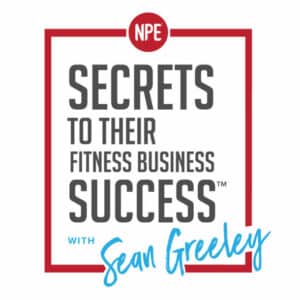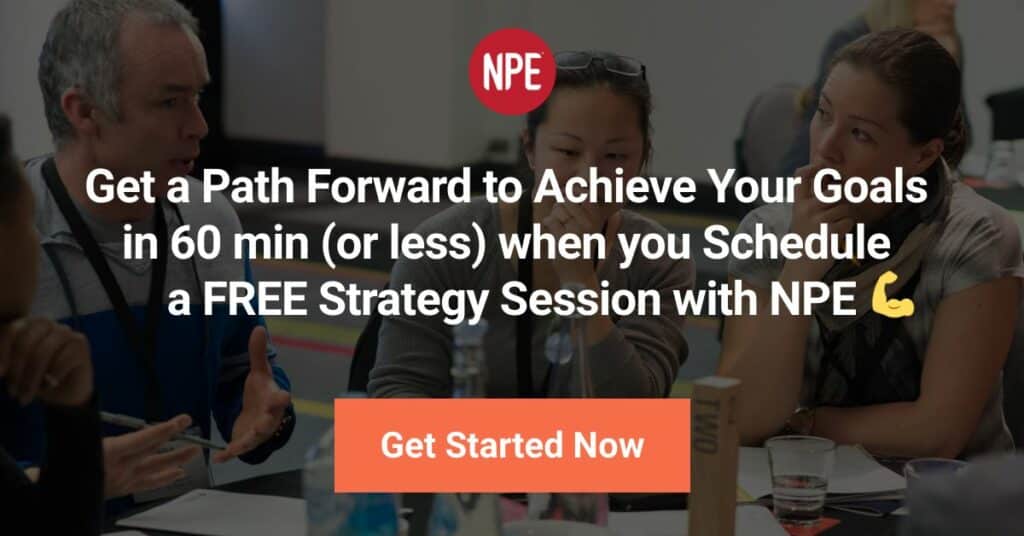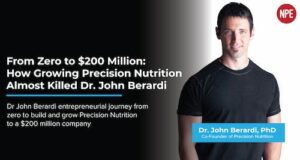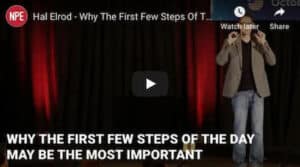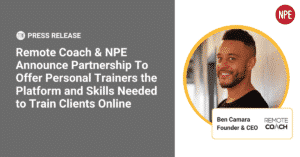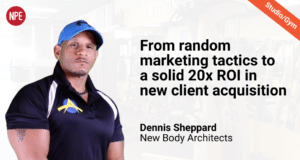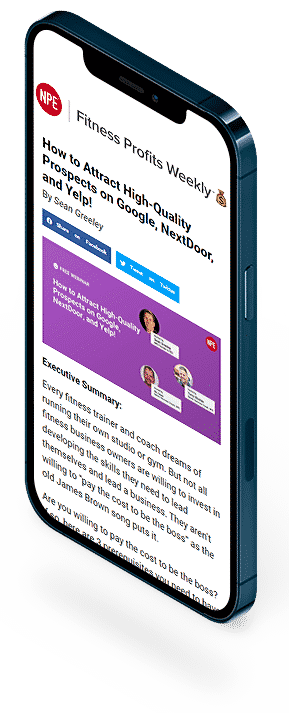Ep 19 – How Hassan Abdallah Rebranded Away From Crossfit and Raised Revenues and Profit On Reopening After COVID-19
Hassan Abdallah owned a CrossFit gym in Kogarah, NSW, Australia. But he began to wonder if he was selling his business short … While young people and athletes loved his CrossFit gym, other people needed more attention.
The pandemic lockdown offered him an opportunity to work through the details. Working with his NPE coaches, he rebranded his business.
He shifted his business model from group training to personal/small group training. He switched from CrossFit athletes to busy professionals and parents. That allowed him to give individual clients more time and attention, with extra programming and nutrition coaching.
In fact, he capped the total member base for his business to 85 (as opposed to 98 prior to the pandemic and a high of 120).
With a greater client experience/quality of service to offer, he was able to raise his rates. That improved profitability, and even during the pandemic, he was able to bring in more revenue (from $28k ‘before’ to $32k ‘after’).
Now the business is running near full capacity and he’s more confident than ever about the future of his business and his ability to serve his clients.
In this episode, you’ll learn:
- The keys to success when you’re rebranding your fitness business, shifting your services, and how to effectively communicate with your clients
- The benefits of downsizing your classes and focusing on delivering extreme value to clients
- The power of practicing faith and realizing your vision of your business is possible despite obstacles
- How Hassan and his team overcame the fear of sales
- How to stay engaged with your clients so they can see results and stick around longer
- The importance of being open to feedback from your coaches, asking your community for help, and pivoting when necessary to allow yourself to grow personally and professionally
- And much much more…
Have questions about your business now? Schedule a free ‘Get Clarity’ Strategy Session
It’s a crazy time for the fitness industry. No doubt you’re feeling stressed and overwhelmed trying to figure everything out. We understand your pain and we’re here to help. Learn more about getting the support you need to win by scheduling a FREE 60-min ‘Get Clarity’ Strategy Session now. Here’s how it works, during your session we’ll:
- Quickly assess where you (and your business) are right now. 🔍
- Together, we identify the biggest opportunities to create an immediate impact on your business and create a strategic plan. 📋
- We’ll show you the systems, tools, and coaching you can use to implement and drive results. 📈
Podcast Transcript
Ric Isaac
Well, hi folks, and welcome to another NPE student interview. Very excited to chat to the one and only Hassan Abdallah today. Great to have you on the call, Hassan.
Hassan Abdallah:
Yeah. Good to see you too, Ric.
Ric Isaac:
Fantastic. I know you and I have had a long history of working together, especially over these last few months and that sort of thing, but others don’t know you, so share a little bit about where your business is at, where your model… or what your model is, I should say, and then the clients that you really love serving, Hassan.
Hassan Abdallah:
Yeah. Awesome. Yeah, just where I was before, I owned CrossFit Volume. We were known as a CrossFit gym. This was just before COVID. I had a CrossFit gym here in Kogarah for six years. I’d been offering personal training and large group training. Then when COVID come around, it gave me a lot of time to have a think about my business model and direction I want to go in, also, lots of lengthy talks with [inaudible 00:01:08] Rick and also with Sean as well. Yeah. Basically, after sitting down and just really having a look at my business and the people that we like to serve, which are busy professionals and busy parents around this Kogarah area, and then the type of training that we do here, we realized that we were a lot more than a CrossFit gym and that it was probably time to move away from CrossFit being our main branding.
Hassan Abdallah:
Yeah. Now I’ve rebranded to Volume Fitness, really focusing on personal training, starting to get into a little bit of semiprivate training, but then the big shift that we’ve done now is we’ve gone to a small group model, where we had our classes average about six to eight people but a maximum of 10 people per class. Reason being is we’re just trying to improve the amount of coaching time our clients get in every session, reduce the amount of members that we would need to sign up here in the gym as well, because we can just bring it down to a cap member base of only 85 members, which then allows us to focus a lot more on our clients and give them a lot more time and attention when it comes to helping them with extra programming or nutrition coaching as well.
Hassan Abdallah:
Yeah, it’s been really good to get the help of NPE through that journey and really help me get to see through all the little cracks and see all the potential with shifting the business model and all the little important steps that have to be made along the way. It’s not just as simple as click your fingers and do it. There’s a lot of important steps that need to be done to make sure that the business’s values are lining up with who we serve and everything else as well. It’s been good.
Ric Isaac:
Well, you’ve mentioned a whole bunch of things there, so I wanted to dive into some of these. There’s a lot of people who’ll be listening to this call who are nodding their heads and going, “You know what? We do more than, I guess, what the CrossFit brand represents, but we’re scared and nervous about trying to rebrand because it’s a big challenge.” What was that like for you, and did you have some nerves around doing that? How was that process for you?
Hassan Abdallah:
Yeah. Definitely a lot of nerves around it. It’s something that has been playing on my mind for a while now. I guess [inaudible 00:03:37] I had a major breakthrough on the phone one day with yourself and Sean and a few other people in the NPE community who have done it before me as well, and that really gave me the confidence to be like, “Okay. Cool. Well, these guys have done it. This is the support for my coaches to go and do it, that I can go and do it.” I just really needed that push. Deep down. I always believed that it was the right thing for my gym. I always believed rebranding to Volume Fitness was going to take us to the next level, and then it all… just from an offering point of view, from a service point of view, from a perspective of people looking into my business and my gym to what they think of it and what it is. I guess, yeah, the most nerve-wracking part for me was you have a lot of clients who are attached to the brand.
Hassan Abdallah:
It’s like they’ve been with you for five to six years. They even loved the training methodology. They loved our coaching style, everything else that comes with it. They love the community vibe. It was just more about telling them, “Look, nothing’s going to change in terms of what you get in coaching quality, in programming quality, but it’s just going to make it better because we’re going to be able to attract better clients. They’re going to fit in with you guys here that I have in the gym now with what you guys believe in and everything else as well.” It was just about reinforcing it to my own clients that what the changes we are making isn’t going to make things worse. It’s just going to make it better. All the good things that we’re currently doing, they’re not going to be taken away. There are still going to be those good things [inaudible 00:05:20]. yeah, I think the way you transfer the message is more important than the actual changing of everything kind of thing. You actually have the right message to your clients when you’re doing it.
Ric Isaac:
Well, I know that a few of the conversations that you had as you were going through this process as well was not just what to communicate, but also how to communicate as well, because we can… In times when we’re doing some of the things that are hard to do, and we’ve got concerns about it, it’s easy to just hide behind an email, isn’t it, and send it out and, “Yeah. Well, hopefully, no one’s going to kick up a fuss,” but you did things very strategically with that in terms of the way that you communicated and the different places that you really conveyed that message. Would you share how that went for you?
Hassan Abdallah:
Yeah. Definitely. Yeah. It went really good. It went really good. Yeah, we didn’t have to go through a sequence kind of thing when doing it and not just kind of snap the finger and do it all at once kind of thing. Yeah. The most important thing was explaining the how and the why behind it, okay? Not just being, “Okay. Cool. We’re changing, and that’s all we’re doing,” so just explaining why you’re changing it and how you’re doing it, certain things like using some of the tools that NPE provide as well with when you are pivoting to raise your rates or anything like that, as well as proper messaging on how to do it in a respectful manner and not just being abrupt about it and stuff, and really showing your clients the value as well and talking them through that process as well, so [inaudible 00:07:07] things that we [inaudible 00:07:09].
Ric Isaac:
You obviously did it well because it’s been well-received in your community, as you mentioned. You had talked a little bit earlier about increasing that coaching time for each client to really deliver a better service, especially for that target market that you want to serve. You also mentioned needing less clients. Does that mean that you’ve put your prices up just for everyone who’s listening to this at home?
Hassan Abdallah:
Yes. Definitely. Definitely. Raising the rates were something that naturally had to happen because you go from a business model where you have anywhere between 16 to 20 people in a class, maybe a capacity of having 120 plus members in your gym to now bringing it down to no more than 10 people in a class and having a capacity of 85 members in the gym. Naturally, yes, we had to raise the rates to fit the business model because now we have less clients. But then on the other side of things as well, it’s not just from a numbers point of view, but then also from a value point of view as well, because now when our clients come to the classes, we have a structure in our groups now where when we have our strength component in our workouts, our clients have a couple of options around the strength training.
Hassan Abdallah:
For example, someone who is into stuff like Olympic weightlifting can select that option when they come to class, where someone who is more about body transformation, body-building stuff, they don’t really care about Olympic weightlifting, they can choose that option. That wasn’t achievable in a large group class. You can’t do it when you have 16 to 20 people running around. But when you have less than 10 people, then you can go, “Okay, cool. You five over here are going to do Olympic weightlifting. Three to four of you are doing bodybuilding.”
Hassan Abdallah:
The coaches can see everything that’s going on and manage everything. Now, not only are we just providing extra coaching time in the sessions, but we’re actually giving the clients what they’ve come for. If I get a 40-year-old father come to my gym, who’s got bad posture sitting at the desk all day, well, maybe snatching is not the best thing for him [inaudible 00:09:21]. Maybe snatching is not the best thing for him, and he should be working on some upper body push and pull sessions, improving his posture, improving upper body strength, getting out of shoulder pain, all that kind of stuff. We’re now also serving our clients’ needs a lot more correctly and a lot more specific to their needs as well. It’s like, yes it’s not semiprivate one-on-one training, but it’s the next best thing after it definitely when they come to our groups, 100%.
Ric Isaac:
That’s awesome. I love the ability. As you said, you’ve made this all about the clients, but let’s just pause for a second. We’re going through arguably the biggest shift and the biggest challenge that the fitness industry has ever had with COVID-19. There’s lockdowns. There’s been this fear and then worry. During that time, you’ve completely rebranded and changed your business model, and you’ve increased your prices, which are the two things that people probably fear the most doing in business, all whilst we’re going through this most tumultuous stage of the industry ever. That’s a pretty ballsy step there, my man, and that’s something that a lot of people would say, “Whoa. No, no. We’ll lose people. They won’t come back. They’ll go somewhere else. They’ll look for a cheaper option. They won’t want to do that.” How was that process for you, putting your prices up, knowing that potentially you were going to risk losing a few clients, but also knowing that that level of service was going to be so much better for those that stayed? How was that like for you, Hassan?
Hassan Abdallah:
Yeah. It scared the shit out of me. That’s just saying the truth. It was something that I’m afraid of and something that I’m still going through, because you’re still facing these objections every day [inaudible 00:11:13] from current clients and also new clients that are coming through. But you got to do the work within. You got to do the work within and realize, “Okay, cool. Well, this is what my service is truly worth. Once you get clarity on that, once you know that this product that [inaudible 00:11:38] service that I’m delivering to my clients is amazing, and it is life changing, and it is going to solve all their health issues, okay, and get them all the results they want, you become a lot more confident to be able to deliver that message.
Hassan Abdallah:
I’m not going to lie. The hardest part was being able to go up to clients who have been so loyal to you for such a long time, and then not just loyal to you for such a long time, but stuck by you during that COVID period, during that lockout period as well, and continued to support your business, but it’s all on face value. You know what I mean? Yes, they committed to me. Yes, they stayed loyal to me, but I’m also so committed to them, and I’m also so loyal to them. I’m not giving out anything or charging anything that I cannot deliver on. You just need to be really confident in that. When you know you can deliver something, well, then you’re confident about it.
Hassan Abdallah:
I just had a lady in my office a couple of hours ago who’s coming back from giving birth, and she’s feeling really insecure with her body and tells me that her body shape is going south and she’s losing fitness and losing strength and losing all that kind of stuff. I’m like, “Well, she needs me.” You know what I mean? If I don’t offer the service that I believe is right for her, just because I think that it might be too expensive, well, I’m not doing her any favors then either. Yeah. I just made sure I just stick by what I believe is going to work. If I believe it’s going to work and I believe it’s worth that, then it’s good.
Hassan Abdallah:
Then on the other side of things as well, as I mentioned before, I capped my gym at 85 members. I’m not after thousands of people. Surely there’s 85 people out there in this Saint George area who are going to value my service. It’s not for everybody. It’s for that particular person who equally wants it as much as I’m willing to help them. You just got to keep reminding yourself of that, that yeah, there is people out there that do want your service and do need your service
Ric Isaac:
And have the wherewithal to pay for it, right? Because that’s part of that ideal client, isn’t it?
Hassan Abdallah:
Yeah.
Ric Isaac:
That avatar that we talk about, they’ve got to not only want to be the people you want to work with and have the problems that you want to solve, but they also need to have the financial ability to make that financial as well as emotional and intellectual [inaudible 00:14:17].
Hassan Abdallah:
Definitely. Definitely. There was those clients of mine who didn’t return after COVID, and it was just because yeah, their situations are tough, and they’ve changed. It doesn’t mean that they’re bad people or anything like that. They just weren’t the right fit at this right time. Maybe things will change for them, their circumstances, as well as their financial situation might change, and they might come back later and reapply to come to the gym. Yeah. I think one thing that I really, really love about the NPE process, when you teach us to… In the sales process, when we’re selling to clients, there’s no hidden secrets. When they first jump on the phone with us and they talk to us, we tell them, “This is what we’re worth. This is what it is, between this price and [inaudible 00:15:08]. It’s something you can afford? It fits in your budget? Yeah, cool. Come in and see us then. If not, then sorry.” We don’t lie to people or try to trick people into joining us. We lay out all the cards there for them to make their own choices, so yeah. It’s good.
Ric Isaac:
Which is really powerful. You’ve implemented it in your sales system since you joined NPE. You obviously changed your model. You’ve changed your pricing and packaging. You’ve capped it at 85, and you need less clients now to hit your financial targets. Obviously, comparatively, you’ve got a lot less backend administration and all that sort of stuff, because you’re dealing with less people as well. Now that you’ve got really clear on who that ideal client is for you guys and who you want to serve, how has that changed or has it improved the culture within the facility and what it’s like to experience fitness in the Cross… sorry, Crossfit Volume, Volume Fitness and what you deliver now?
Hassan Abdallah:
Yeah, that’s a good question. I asked my coaches, Because they do most of the coaching work. I’m in the office a lot these days. I asked them, I said to them, from their point of view, I said, “How do you find our group sessions now? How do you find the clients and stuff? “They were like, “As a coach, I haven’t changed, but the one thing that I do more of now is I just coach more,” because before, they were like, okay, coaching, but then also delegating, but then also arranging the room for the class and stuff like that. They were like, “You know what? Now we have less clients in our faces in every class. We just actually get to coach more.” Okay? That’s one thing that’s been a change.
Hassan Abdallah:
Then the other thing that’s been a change too, you mentioned the backend of the administration side of things, a massive part of what we do here is client retention and really staying engaged with our clients. Amongst myself and the rest of the coaches here, we all have a case load of clients that we do our one week check-ins with and four week assessments and stuff like that between programs, and we can get through that all a lot easier with less clients. It improves your retention as well. Even before we changed this model, we were always strict on the kind of client that we let join our gym. Okay? Because we want to make sure the environment is really good and the culture’s really good. But since we have introduced this new model, then we’re just not signing up as many new clients because we don’t need to.
Hassan Abdallah:
Every single time someone does join, they are quality. You’re 100% sure of that because, A, they’re making a really big commitment to join us, and through that commitment, you know that you have a committed client and a loyal client, and then they come into our community here and join everyone else. Everyone’s just on the same page. You don’t see new faces every single month and every single week. It’s this tight-knit bunch of people. [inaudible 00:18:15] same group going in the morning, the same group going in the afternoon, and they’re just really bonding well together. Yeah. It’s definitely made the community stronger, sticking together through the tough times and now [inaudible 00:18:25] the backend of it, I think. It’s good.
Ric Isaac:
Well, that is good, especially with that community and people building better relationships. I guess from what you explained as well, not only are you able to give a better service and do more of those followups and checkups and then retention-based activities, but also because you’re not having to just market like crazy because you’ve got to get people in the door. You are getting more people who fit the culture and make a longer-term commitment, because that’s hugely time-consuming. Isn’t it? When you get a bunch of new clients, you might have done a specific marketing campaign. You’ve got to go through and make sure you’ve consulted with them all, but then you’ve got to do whatever onboarding it might’ve been and get them all figured out. Then if they’re leaving four, six, eight weeks later, it’s just a complete waste of everyone’s time, isn’t it? It’s exhausting.
Hassan Abdallah:
Yeah. Yeah. Definitely. Definitely. Yeah. Having a smaller membership base allows you to narrow it down a lot more who your ideal client is and who you want to serve. Yeah. I honestly don’t find the marketing or sales process stressful, because it isn’t. It’s more enjoyable now, because you don’t have to chase a big number. You’re just trying to narrow it down to that specific client. Then when they do come in, like the lady that came in earlier today, it’s a match made in heaven. It’s like, “Okay. Well, this is what you need. We offer it. Let’s make it work.” Yeah. It’s a lot more better when you can narrow it down and then know exactly who you want to serve. It’s good.
Ric Isaac:
Well, I love what you said there, and I just jotted it down in my notes. You mentioned it’s the internal work, a few minutes ago. You’ve got to work on yourself to overcome some of these challenges. What I’ve loved is seeing your growth and development through the program, Hassan. For those who have you on the calls, you’ll say whatever it is, a challenge or whatever, and then you’ll sit back and think about the answer. What’s really impressive is there’s a lot of people that… and I’ve seen at times where you’ve felt like you wanted to say, “But no, no, no, because we have to do this, and because of this. No, no, that won’t work for me,” or, “No, because my business is different,” or because of whatever else. But what’s impressive is you sit back and go, “Let me just think about that.”
Ric Isaac:
Then on the next call or the next time we catch up, you’re like, “Okay. Well, I had some questions about how this will work and that would work.” You’re not new to coaching. You’ve had and worked with other coaches before. What’s enabled you to stay so open, and especially when it comes to those pivots that we need to make in our business, and reflecting on what you really want to do? Why has that been so different with the NPE experience rather than with some of the other coaches you’ve worked with?
Hassan Abdallah:
Firstly, with previous coaching that I’ve had compared to NPE is the level of engagement with NPE is extremely high. We have weekly call. For me, it’s every Wednesday. The calls go for two hours. It’s a time where you just get to really just show up. Okay? That’s the number one thing that you got to do, is just show up to the calls. I always tell myself [inaudible 00:21:47] never miss them. Then once you show up to the call, then you just do the work on the call with the coaches and just really nut out what it is that you need to work on or what it is that you’re struggling with and stuff. Then you can just know that you have to come back to that call again next week. You have to make sure that you’ve worked on it and done it.
Hassan Abdallah:
The level of engagement and the accountability is extremely high. That’s what I find really engaging, because it’s exactly like my clients here in the gym. They want to be always constantly engaged and held accountable and stuff like that. Well, as a business owner, I want to as well. For me, I’m in this business on my own, so I’m a sole business owner. It’s pretty common in the fitness business that there’s a lot of partnerships as well. It’s always like someone’s got a partner in the business with them, and then sort of [inaudible 00:22:43] a lot of time that they’re alone. I’m alone. If I don’t have NPE to talk to about my problems or issues I’m having, then who do I flesh it out with? You know what I mean? That’s why I’ve found just what’s allowed me to pivot and grow is jus, yeah, to continue to show up for the calls, to be as open as possible with what I’m struggling with and what I need help with, and then just take the feedback on and just take action on it. You know what I mean?
Hassan Abdallah:
Yeah. I don’t really have to think twice with you guys. Yeah. I just take the advice onboard, and I go and try it. Then yeah, the majority of the times that I go to try it, it works for me. I think that’s the biggest thing, just be open. Just be open, be present, and be honest, and just take it on. That’s the biggest change for me. At the end of call or during the call, there’s always a takeaway, maybe more than one takeaway from that session, which just allows you to grow week on week and change things week on week. It’s not overwhelming either. It’s just a step-by-step process too as well, which is good. Other places are just like, “Here’s the work, a whole bunch of it. Go and do it,” kind of thing, but this is just a nice week-by-week, just keep changing things slowly, slowly, and yeah, it gets better every single week.
Ric Isaac:
Well, I love it. You have been super committed to those calls. It’s brilliant to have you there. Something that I really resonate with that you mentioned there, you try and be completely honest, and that takes strength and courage, because being vulnerable in front of others and around your peers is often really hard to do, and on those calls, having… I’ve obviously been part of the myself. Then it’s amazing to see when one person does it, like you start by being vulnerable about something, and then it just opens up and creates that space for everyone else to step into, and then they can know that it’s a safe environment. They can really share all their challenges and concerns and sometimes fears and worries and stresses too, because it’s that sounding board. There’ll be a lot of people thinking to themselves, “Well, hang on. We’ve gone through this really stressful financial period with lockdowns and fear with our members and with the wider community, and you’re paying for this coaching. Why didn’t you just cut the coaching and save the money that you’re making there?” What would your answer be to that, Hassan?
Hassan Abdallah:
Man, yeah. That’s a good question. I joined NPE probably, what, maybe a month before COVID [crosstalk 00:25:32].
Ric Isaac:
[crosstalk 00:25:30] I think it was February you jumped on board, and then it all-
Hassan Abdallah:
Yeah. Yeah.
Ric Isaac:
Yeah.
Hassan Abdallah:
Yeah, about three months before, and then we had the event in Sydney. Everything was going good. I was building all the blocks slowly and stuff and getting [inaudible 00:25:48] and getting race ready. I was on the backend of getting race ready, and then we had the Sydney event. Then the lockdown hit. Yeah, like you’re saying, it probably would have been something easier to just be like, “Yeah, let’s save myself some money and put it on hold.” But to be honest, it’s what I needed more than anything at that time. To sit there and just have the coaches to talk to and the rest of the other gym owners around me who were struggling as well, that was what kept me alive pretty much. I think that saving that money on business coaching probably would have just ended pretty miserably for my business. A lot of the pivoting decisions and the choices that we made there, because I spoke about being lonely in the business, well, during COVID, I was even more lovely because I didn’t have the gym either to come to. [Inaudible 00:26:50] talk to your clients and stuff like that as well.
Hassan Abdallah:
Yeah. Some of the advice that was given to us during COVID just, yeah, was amazing, from how to stay alive, how to negotiate things with landlords, and how to still hold the value for our clients, and how to pivot to virtual, because it was totally new. No one knew what to do during that time. Then to have that professional guidance and professional advice was exactly what we needed. Yeah, it was the last thing on my mind to cut it then. It’s definitely worth the investment. I remember having a conversation with you about that as well early on in February and stuff like that. You said [inaudible 00:27:37] you know? “We can have a conversation down the track, and you can let me know whether it was worth it or not.” Well, mate, it’s definitely been worth it. That’s for sure.
Ric Isaac:
Well, good on you, and you only get out of it what you put in. You’ve been awesome as part of our community as well. What would your advice be for others, Hassan? It is a really challenging, new world that we’re living in, and people are really struggling with maybe their model, maybe their pricing and packaging, maybe the systems that they either do or don’t have, and they’re looking for ways in being able to help more people and do it in a way that aligns to their values more, just like you described earlier. What would your advice be for them if they are looking for support and wanting and needing help?
Hassan Abdallah:
Yeah. Well, for themselves personally, you’ve got to do what you really believe is right, in the fitness industry, the right thing for your clients, the thing that you’re passionate about as well. If you’re no longer passionate about large group fitness or a certain style of training or a certain demographic that you’re marketing towards or clients that you’re marketing towards, well, then stop doing it, because you’re not going to get anywhere unless you believe in it yourself, because if you don’t believe that this style of training or this type of group or this demographic is the right ones that you’re passionate about serving, well, then you’re doing it wrong, and you’re not going to be able to get the maximum result out of that. That’s firstly.
Hassan Abdallah:
Then secondly, if you do have this type of business model that you think might be good and a type of clients that you want to serve and a type of system that you want to run but you’re not sure how to do it, then seek the help out. You know what I mean? Seek the help out, because I guess once you get clear on what you want, and then you also have this professional guidance and help from business coaches helping you every step of the way, then it’s very hard to get it wrong then. It’s very hard to get it wrong then when you get given the systems to put into place and you’re the passionate person running those systems and stuff.
Hassan Abdallah:
Yeah. It takes a lot of the heavy lifting away and all the guesswork away and really helps you focus on the things that are important and, yeah, just really fill those holes that you’re not good at, the things that you really struggle with in your business that you don’t know what to do with properly. Well, then go and get help with it. Even if you’ve got to spend your money and invest in it, it’s got to come back. It’s going to come back. Just do it, and don’t be afraid. Yeah. Definitely.
Ric Isaac:
Great advice there, and I appreciate you sharing that. Obviously, you’ve come through this challenging period. You’ve got yourself primed for not only a good 2021, but even right through the end of 2020, even where a lot of other businesses are… Well, they’ve either closed or they’re really struggling. You’ve been able to get a lot of those systems in place, which is absolutely awesome. We can’t wait to see what else you’re going to achieve over that period. There’ll be a lot of people saying, “Well, that’s okay for him because it’s…” whatever. “It’s easier. He’s in a better location. He doesn’t have as many time requirements as I do.” But all of that is what we call head trash. Right? You’ve got all those things. You’ve got a relatively young child at home and a young family that you’re supporting as well. You’ve had to make some big changes to the way you’re doing things and really go through some of those hard yards, as you mentioned, to change your model and have courage and practice faith so that you can get to where you want to go.
Ric Isaac:
That’s super impressive and super inspirational for others. I know there’ll be people listening to this, thinking, “Well, yeah. If he was able to do it…” because it’s maybe been eating away at them. Because we all fall into it, don’t we? We fall into the patterns and habits. When you realize, when you’ve got an opportunity to sit back like COVID, that your business has turned into this thing that you’re not even in love with anymore, and you don’t actually even want to be doing it… But so many don’t make that change, do they? They won’t actually be brave and either seek out and get the help to do it or at least know what to do and take that first step, which is awesome. Is there anything else that you’d like to share with those that are listening to the call today, Hassan? Any little finishing quotes or gems of wisdom or nuggets of gold from your experiences in life and business?
Hassan Abdallah:
Yeah, mate. I guess it’s a very old cliche kind of quote. If it doesn’t challenge you, then it’s not going to change you. It’s as simple as that. There’s no easy road. There’s no such thing as an easy road. There’s no such thing as a miracle formula or anything like that. It’s all hard work. You got to be willing to do the work, and then you got to be willing to face the challenges and make the changes. It’s as simple as that. Yeah. You just got to ask yourself, “How badly do I want it? How much do I actually want to succeed?” If you want it bad enough, then you won’t just sit around. You’ll stand up. You’ll talk up. You’ll put your hand up. You’ll ask for help. You’ll go out there and make the changes.
Hassan Abdallah:
In terms of NPE, I stepped into an amazing community. I was referred from friends of mine as well. Yeah. It obviously helps to hear it from my friends who say, “It’s one of the best business coachings that I’ve had before, and it’s an amazing community to be a part of.” That obviously does help. If I can help other people as well and give them my word and say that, “You know what? It is a really good community. All the business coaches are extremely helpful…” Yeah. You really do take out your time and put in the effort and go the extra mile for us all, which we’re extremely grateful for. Yeah, the NPE community is full of a bunch of amazing humans all around the world, pretty much, business coaches, who are all in the same boat as each other. I’ve met so many business owners who have such a similar model to mine, so that similar ideal client, anything like that, and just to be able to bounce feedback off of them every single week has been… It’s invaluable. Yeah, really good. Thank you.
Ric Isaac:
Well, thank you, and really appreciate your time today, Hassan. I know you’re extremely busy, and you’ve got lots going on. What you’ve just shared there over the last 30, 35 minutes has been priceless. I’m sure people will be going back over this and listening to it again. Thank you for being such an amazing part of our community. We absolutely love it. We can’t wait to be able to do our live events again, hopefully soon, because that’s when we’ll all get to catch up, but this is as good as it gets from a second place of that. But thanks for your time, Hassan. Thanks for being so committed to doing the work that you needed to do, and thank you for the entire Saint George community, because you really are making a massive impact on people’s lives and helping them to be the best versions of themselves.
Hassan Abdallah:
Awesome. Yeah. Thank you, Ric. I appreciate it, mate. Thank you.
Ric Isaac:
All right. Good on you. We’ll speak to you very soon.
Hassan Abdallah:
Thanks, mate. [inaudible 00:35:29]
